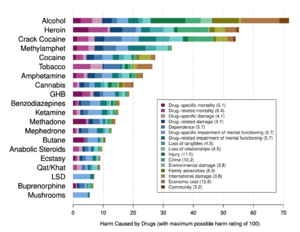Medicine:Withdrawal syndrome
From HandWiki
This article does not cite any external source. HandWiki requires at least one external source. See citing external sources. (March 2017) (Learn how and when to remove this template message) |
A withdrawal syndrome (also called a discontinuation syndrome) is a set of symptoms occurring in discontinuation or dosage reduction of some types of medications and recreational drugs. The risk of a discontinuation syndrome occurring increases with dosage and length of use.
- Alcohol withdrawal syndrome, symptoms seen when an individual reduces or stops alcohol consumption after periods of excessive alcohol intake
- Antidepressant discontinuation syndrome, a syndrome that can occur following the interruption, dose reduction, or discontinuation of SSRI or SNRI medications
- Antipsychotic withdrawal syndrome or dopamine supersensitivity psychosis, symptoms seen when an individual reduces or suddenly stops antipsychotics
- Benzodiazepine withdrawal syndrome, symptoms that appear when a long term user stops taking benzodiazepines or reduces the dosage
- Cannabis withdrawal, a form of withdrawal associated with the substance cannabis
- Drug withdrawal
- Neonatal withdrawal, a withdrawal syndrome of infants, caused by administration of drugs or the prenatal exposure to a substance
- Nicotine withdrawal, the effects felt by a person who is nicotine dependent and suddenly stops or significantly reduces his or her nicotine intake
- Opioid withdrawal, symptoms seen with the cessation or rapid reduction of intake of opioid class drugs
See also
External links
| Classification |
|---|


